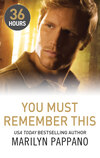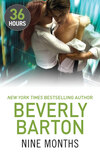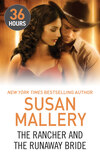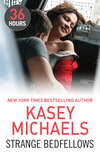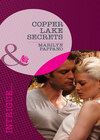Kitabı oku: «You Must Remember This», sayfa 3
She stifled a yawn, and he checked the time. It was only nine—not too late for him, but he didn’t have to go to work tomorrow. He could stay up until dawn and sleep till noon, and no one would care.
Setting his empty glass aside, he got to his feet. “I’d better go.” Even to himself, he sounded tentative, as if one word from her could change his mind. Stay. Don’t go. Spend the night.
He doubted he had ever been particularly fanciful, but his imagination had run wild in the last two weeks, all without the slightest encouragement. To Juliet Crandall, he was a mystery, no more. A puzzle with its pieces jumbled. She probably hadn’t thought of him even once as a getting-involved, kissing-and-seducing, making-love-and-babies-and-a-future-with kind of man.
She probably never would.
* * *
Juliet stood in the doorway, watching as Martin walked into the night. He moved quickly, silently—stealthily, she thought—into the shadows, disappearing from sight.
Was he a criminal? Was that why he moved like that, why he’d been able to sneak up on her in the kitchen tonight? Did that explain how he’d been able to take a few seconds’ look at her door and yard and find the weaknesses from a security standpoint?
She closed and locked the door, then went into the dining room. By the time she settled in her chair, the computer was up and running. There was a batch of E-mails awaiting her. She scanned the list, but didn’t open any messages.
What did she really know about these people? What did it say about her that her only friends were virtual strangers, hiding behind screen names and identities that were as likely fabricated as truthful? They’d told her their names, marital status, occupations, but online, it was easy to be something you weren’t. Heavens, they thought she was interesting, and online, she was. Her fingers never tripped over words the way her tongue did in a real-life conversation. If she embarrassed herself—as she’d done in the kitchen—no one was there to see it. As far as they were concerned, she was friendly, outgoing, competent and fun.
Geez, maybe they were scam artists, stalkers, rapists and killers.
But more likely they were just average people, a little lonely and a little lost. Like her. Like Martin.
Exiting the mailbox, she called up her favorite search engine and typed in one word. Her search was far too general, giving her every site listed that contained the word amnesia. There were more than twelve million hits. Rather than try to narrow it, she began sorting through them one by one, occasionally stopping to link to another site. By midnight her eyes were gritty, her back was aching, and she’d increased her knowledge of amnesia a hundredfold. But she hadn’t learned anything that could help Martin.
Did it matter? Now that he knew how little she could do, he would probably keep his distance. She sincerely wished she could help—she wouldn’t mind his gratitude at all—but she wasn’t a miracle worker. She had to have something to work with.
Still, she couldn’t help feeling as if she’d somehow let him down.
She would do what she could—send out a missing persons bulletin again and search as many places as she could think of—and that would be the end of it. It was just as well. She didn’t want any man simply because he was grateful for what she’d done for him. If he couldn’t appreciate her for herself, it was his loss. Wasn’t that what her parents had always told her?
But they’d been wrong. It was her loss, too. Living alone, being alone, seeing other women her age with husbands and children and having no opportunity for her own family in sight—those were her losses, and she lived with them every day.
Clicking the mouse, she backed out of the sites she had accessed, thought for a moment about reading her mail, then shut down. She turned off the lights as she made her way to the bedroom.
It was a nice size, with room for the furniture that had been her grandparents’ and a thickly padded chaise that was her favorite place to curl up on a sleepless night. It was a pretty room, too, painted pale peach on two walls and deep coral on the others. The linens were a coral-and-teal floral, the curtains at the window frilly coral, the slipcover on the chaise frilly teal. There were ruffled pillows on the bed and the chaise, and lacy crocheted doilies—gifts from Grandma—everywhere.
It was a woman’s room, she acknowledged as she undid the buttons on her dress. Everywhere she looked, she saw ruffles and frills. Only a man secure in his masculinity could lie in that bed or stretch out on the chaise without being totally overwhelmed.
Martin came to mind.
Her fingers stopped on the buttons as she turned to face the mirror, to see what he had seen when he’d first arrived. The fabric gapped to her waist—not a lot, not immodestly, but enough. The material was soft and pretty, like an impressionist watercolor, and the skin that showed was pale. Tentatively she touched herself, just one fingertip at the point of the vee, drawing it slowly along exposed skin to her waist. Closing her eyes, she did it again, only this time, in her mind, the hand was dark, the fingertip callused, the touch incredibly sexual. It was enough to make her shiver, then flush.
She wasn’t so terribly needy that she had to fantasize over a man who clearly held little interest in her as a woman. It hadn’t been so long since she’d had sex. It had lasted the weekend—the entire weekend—and had been the best sex she’d ever experienced, and it had been only…
Only twenty months ago. She scowled. She was needy enough to fantasize about Martin Smith. But it was only fair. He was so well suited for feminine fantasies.
Giving herself a shake, she finished undressing and got ready for bed. She was lucky enough to be a sound sleeper, and she slept through the night, awakening in plenty of time for breakfast before work. The job at the library was okay, but she liked her three days at the police department better. The clerk who worked in the office, Mariellen, required constant supervision, but Juliet liked everyone else and she liked the work.
She was only a few blocks from the house when she spied a familiar figure ahead. Martin didn’t have a driver’s license, according to Tracey at the library. He didn’t have any official documents at all. There must be some provision for obtaining them when you truly had no idea who you were, but maybe he wasn’t interested. Maybe he couldn’t face becoming Martin Smith officially. Maybe he feared that would somehow rob him of the man he really was.
As she drove the half block that separated them, she debated, then pulled to the curb. “Can I give you a ride?”
When he turned her way, he looked exhausted. His eyes were bloodshot, his features fixed in a scowl. “I’m not going anywhere.”
A curious answer. “Then how about a ride home?”
After a moment’s hesitation, he climbed in beside her. He was so tall and broad-shouldered that immediately the car seemed to shrink by half.
“Tough night?”
He tilted his head back and closed his eyes. “Yeah. I couldn’t sleep.”
She wondered how hard he had tried. His jaw was unshaven, his hair disheveled as if he—or someone—had combed it with his—or her?—fingers, and he still wore the same snug jeans and emerald shirt he’d worn to her house last night. She could see the pop stains on the lower leg.
She had assumed, when he’d said good-night, that he was going home. Now she wondered. Not that it was any of her business.
Realizing that they weren’t moving, he looked at her. “What are you waiting for?”
“I don’t know where you live.”
He gave her the address, only five blocks in the opposite direction. She made a U-turn and tried very hard to think of something to say, anything at all to break the silence that pricked at her and didn’t seem to bother him in the least. Before she came up with a single, simple, asinine comment—nice day, for God’s sake—she was pulling into his driveway.
The house was old and lovely, three stories, big enough for a family or two or three. She looked at it, then him. “You live here?” Brilliant, Juliet. He told you he did, didn’t he?
“Back there.” He gestured toward the back, and she saw the detached garage with an apartment overhead. “Thanks for the ride.”
That was it—no goodbye, no mention of last night, no small talk, nothing personal at all. Thanks for the ride.
“You’re pathetic, Juliet,” she berated herself as she backed into the street again. “Any other female in town could have done better than that. Five blocks, and you don’t say a word—not a word! And you wonder why men don’t go nuts over you.”
No, that wasn’t true. She never expected men to even notice her. Last night Martin had suggested that he might have been unnoticeable in his previous life, which was laughable. She knew unnoticeable, because she was. All her life people had been looking through her. Maybe she could have gotten by okay being plain and too smart, but shyness on top of plainness and braininess was the kiss of death.
And she wasn’t kidding herself: she was plain. Only her parents had ever thought differently, and they were supposed to think she was beautiful because they loved her. She had always thought that someday some man would also think she was beautiful, because that would surely mean he loved her, but it had never happened, and it probably never would.
Even if it did, it wouldn’t necessarily mean he loved her. It might just mean his vision wasn’t so great.
Her office in the Grand Springs Police Department was nothing fancy. Since she would soon be doing the job, she was already situated in the records supervisor’s office, a square room with a big window, like her other office, that gave her a view of the daily workings of the department. She rarely had time to look…but she’d always managed to find a few minutes whenever Martin had come in to visit one detective or another.
She locked her purse in the bottom desk drawer, picked up her coffee cup and headed for the machine in the outer room. Once the cup was filled, she stopped at Stone Richardson’s desk. The detective was typing a report and grumbling under his breath. He sat back in his chair. “What can I do for you?”
“I talked to Martin Smith last night. He said you guys did a missing persons broadcast right after his accident.”
“Yeah. We got a couple of possible hits, but they didn’t pan out. You have an idea?”
“I’d like to do it again. Maybe, at that time, no one was aware that he was missing, but surely after ten months, someone has realized that something’s wrong.”
“Good idea. The file is in your office. Go to it.”
With a smile of thanks, she took the coffee back to her office, pulled the folder and pulled up the National Crime Information Center on her computer.
She was working on the required state certification as an NCIC terminal operator, along with her other duties, but she’d been granted access in the meantime. It was slow going, though. Ditzy Mariellen, whose desk sat right outside the door, could have the information typed in and the broadcast sent in the time it would take Juliet to thumb through the manual that would help her locate and fill out the proper form.
But she didn’t hand the file to Mariellen. She opened it and studied Stone’s notes. A John Doe white male, approximately forty years of age, six-three, blond and blue. Not much of a description for the best-looking man she’d come across in recent memory. There were notes on the scars—six in all, the last attributed to a burn—but no other identifying marks, no tattoos, no birthmarks. Of course, six scars were enough.
He feared he’d lived a violent life, and the evidence seemed to be on his side. Innocent people did become victims, but three times, possibly four?
She just couldn’t imagine him as a criminal. And why not? Because he was handsome? A quick look through the mug books would confirm that handsome men did, in fact, commit crimes. Because he seemed so lost? She couldn’t call any figures to mind at the moment, but she suspected that lost, lonely people were more likely to commit crimes than happy, well-adjusted people with everything going their way. Because she was attracted to him? Heavens, she’d been attracted to losers before. The last man in her life had been unethical and immoral. Criminal was just one short step down.
Still, she didn’t believe Martin Smith had been a criminal before his accident. Even if he had been, he was a different man now. People could change. Wasn’t waking up a new person one of her favorite fantasies? With his accident last summer, Martin had been given the perfect opportunity to start over new, with no name, no memories and no past to haunt him. He could be anyone he wanted to be, could correct old mistakes and make right bad choices. It could be a dream come true.
The questions were the only downside. To fully accept and enjoy his new life, he had to know about his old life. Were there parents who missed him, a wife who mourned him, children who were slowly forgetting him? Or had he been alone, with no one to care?
They would find out soon enough. A loving family surely would have turned to the police for help when he failed to return from his trip. Surely they would be searching for him, distributing flyers, setting up social networking pages, showing photographs, asking questions. Surely there would be a response to this broadcast she was about to send to every law enforcement agency in the country.
And if there wasn’t?
Then he was more than likely a free man, free to make a new life for himself. The odds of him including her in it, even temporarily, weren’t great, but she could always dream, couldn’t she?
Chapter Three
The Courthouse Deli was located across the street and down a block from the police department. It was busy from noon to one, but after that a diner looking for privacy couldn’t find a better place. Bringing along official-looking reading and choosing a table in the distant corner helped keep most people away…but Martin wasn’t most people.
He walked past two dozen empty tables to the back, stopping beside the empty chair. “Mind if I join you?”
Juliet looked surprised but didn’t say a word as he slid into the chair and folded his hands together on the table. “They told me over at the department that you usually eat lunch here.” A simple statement that wasn’t entirely true. One of the dispatchers had told him that—a week ago—and she’d said “always.” She always eats at the deli and sits in the back facing the wall to discourage anyone from noticing her. The only problem with that was that he wasn’t so easily discouraged and she was far from unnoticeable.
“That doesn’t look like light reading.”
She glanced down at the newsletter. “It’s about the new computer system. Once it’s up and running, it’ll offer better versions of everything—image processing, automated single fingerprint matching, new databases, linkage fields and automated statistical collection. With the equipment that will be available in the patrol cars, an officer in the field is able to take photographs and scan a single fingerprint, then send them to the bureau and have a response back so much faster. It will be—” She broke off abruptly and shrugged. “A big improvement. Grand Springs will finally catch up with the big cities.”
For a moment there she had been supremely confident, as she should be. The instant the thought had occurred to her, though, that she might be talking too much, the confidence had faded away with the words. Too bad.
“So part of your job is getting the Grand Springs PD up to speed for this new system.”
She nodded.
“It can’t be easy. Some of those guys hate change.”
“Once they realize how much easier the system makes their job, they’ll love it.” She fell silent while the waitress came to take his order, then said, “I sent out another missing persons broadcast this morning. Maybe we’ll get somewhere this time.”
“How long will that take?”
“I don’t know. I’m still pretty new at this.”
Stone had told him the last time that a positive response was difficult to predict. It could take a few hours or, if a department was really swamped, a few months. If there was no missing persons report out there that matched his description, there would be no response at all. That had been hard enough to face ten months ago. It would be even harder now, finding out that he’d been the kind of person who could simply disappear from the face of the earth and no one cared.
The suspicion that he’d been exactly that kind of person made him uneasy. Deliberately he changed the subject. “Did you work in law enforcement in Dallas?”
“No. I worked for a large corporation that had its fingers in a little bit of everything. I set up their systems, wrote programs specific to their needs and kept everything running. When this position came up, I applied and was hired. The library job seemed okay, but the police department job sounded ex—interesting.”
Exciting. To a computer genius who spent more time with machines than people, even the fringes of police work probably did sound exciting. “Is it interesting?”
“It beats cataloguing library books.” She said it with a smile, too light and sweet for the likes of him. He stared at her until it faded, until her blue gaze dropped away from his and familiar discomfort came into her manner.
The waitress served their meal. After scraping the lettuce from her sandwich, Juliet asked, “Did you get some sleep this morning?”
Such an innocent question to spark such intimate images linked one to another: sleep, bed, Juliet, naked, hot, needy, desperate. Fumbling for his glass, he took a drink, swallowed hard and blinked to clear his vision. “Yes.” He had spent half the night pacing his apartment and the other half roaming the streets. He’d had a glass of milk at the all-night diner—the cook’s remedy for insomnia—and walked until he was exhausted. He’d needed the ride she’d given him—had been half asleep before it was over—and had slept the sleep of the dead the rest of the morning.
All because last night he had dreamed the dreams of the dead.
“Have you had insomnia since the accident?”
His throat was still tight, his voice still husky. “I don’t have insomnia.”
“But this morning you said you couldn’t sleep.”
And she had assumed, as everyone else did, that by couldn’t, he meant physically unable to. That was what he wanted them to think, wasn’t it? “I wouldn’t let myself fall asleep last night.” His tone was halting, his gaze fixed on his hands. They were familiar, yet strange. Long fingers, callused skin, strong grip, capable of all the things hands were designed for and maybe more. Capable, maybe, of inflicting great pain, of stealing someone else’s very life. “Sometimes I have dreams….”
She leaned forward, and her voice brightened, as if the subject had suddenly become ex—interesting. “About your past?”
“I think so. I don’t know. Maybe not.” Please, God, no.
“What kind of dreams?”
“Just dreams.”
“You don’t remember them?”
His silence let her believe one answer, but the truth was completely different. He remembered too much. Not enough.
“Are you in these dreams?”
“Look, I’d rather not—”
“But they may be important. Maybe the key to your memory is in these dreams, Martin.”
It was the first time she’d said his name. Such a plain, simple name, serviceable but nothing special. But it sounded special in her voice. “Look, they’re just dreams, nothing more. They don’t mean anything. They’re not important.”
“But they disturb you.”
He scowled, wishing he’d let her believe, like everyone else, that he was an insomniac. Since it was too late for that, he chose instead to turn the conversation in a direction that was sure to make her forget his sleep problems. “Not as much as you do.”
She stared at him, her face turning as red as the cloth on the table. “I didn’t…” She fidgeted, then straightened and sat primly. “I don’t know what you mean.”
“No, Juliet, I’m sure you don’t,” he agreed quietly, then lightened up. “When you were in school, did the kids tease you about your name?”
Her look was wary, her tone cautious. “Of course. How could they resist?”
“‘What light through yonder window breaks? It is the east, and Juliet is the sun!’”
“My mother was a fan of Shakespeare. What can I say?”
“There are worse things in the world to be named after.”
“Like a soap opera hunk?”
He nodded.
“I did some reading about amnesia last night.”
“You keep medical books around the house?”
“On the Internet.”
He’d left last night so she could go to bed. If he’d known she was going to stay up late, he would have hung around until she’d shoved him out the door. He would have delayed going home and to bed himself, would have delayed the nightmares. “Learn anything interesting?”
“Lots, but nothing that might help.”
“I don’t think I was computer-friendly. All this online stuff seems like a whole new world to me.”
“It’s the way everything is done now. It can offer some pretty vast possibilities.”
“It can also isolate you. It offers so many possibilities that you lose the need for real people in your life.”
“But if you don’t have real people in your life, it’s a decent substitute.”
He wondered about that. Maybe standing on the sidelines watching life go by via a computer monitor was okay for her, but he suspected it would make him just that much hungrier for human contact.
He was already pretty damn hungry for contact with her.
Finishing with her meal, she tucked the computer newsletter in her bag, picked up her tab and got to her feet. “I’ve got to get back to work.”
“I’m heading that way. Mind if I walk with you?”
Her only response was a shake of her head.
The weather was springtime warm, which didn’t mean they were safe from a cold snap or even snow. After all, it was only late April. They could easily wake up any time in the next month and find themselves snowed in.
He knew where he hoped he would be in the event of such luck.
The block-long walk passed quickly. Too soon they were inside the police department, and Juliet was looking eager to gain the privacy of her office. He tried to think of something to say—some excuse to see her again, some courage to ask for another evening of her time—but the words didn’t come. With a faint smile and a murmured “See you around,” she went down the hall to her office. A moment later he saw her through the window, taking a seat at her desk, turning her attention immediately to the computer there.
“Look, Jack, a Peeping Tom right here in the department.”
He glanced over his shoulder to find Stone Richardson and Jack Stryker, another detective who was working the Olivia Stuart homicide, standing behind him.
“What’s so interesting?” Stryker looked, then shrugged. “Oh. The new records supervisor.” He said it as if Juliet were of no more interest than the grandmotherly administrative assistant sitting outside the chief’s office, as if she weren’t the prettiest woman to set foot in Grand Springs in a long time.
Come to think of it, Stone didn’t seem particularly impressed, either. Granted, both men had gotten married in the last year—Jack to Josie Reynolds, the town treasurer, and Stone to Jessica Hanson, the bookkeeper at the ski lodge—but did that mean they’d lost their ability to recognize beauty when they saw it?
To each his own, so the saying went, and apparently it was true. After all, while Martin liked what he knew of Josie and Jessica, he personally didn’t find either particularly attractive. It was clear, though, that their husbands thought differently.
“You looking for us?”
The two detectives were so far from the reason for Martin’s presence in the department that, for a moment, Stone’s question didn’t register. Finally, though, he offered a noncommittal shrug. “Any news?”
“On Olivia’s case?” The cop shook his head. “Still no sign of Springer.”
Dean Springer had lived in Grand Springs without attracting anyone’s attention for years. He’d been a nobody, a loner who kept a low profile and minded his own business. Somehow his business had come to include the mayor’s death. The woman who had actually carried out the murder had identified Springer as the man who’d hired her, but there was no question that he’d merely been the go-between. He was neither smart enough nor prosperous enough to arrange a murder-for-hire, and there was the little matter of lack of motive. No, he’d been working for someone else. If the police ever located him, maybe they would find out who.
What if it was Martin?
“Juliet sent out another broadcast on you today.”
Still troubled by his doubts, he gave Stone little attention. “Yeah, she told me. I’d better get going.” He had a job this afternoon, and for the next few days, over at Grace Tabernacle on Aspen Street. Reverend Murphy had hired him to help with a renovation project too small to hire out to professionals. Considering his luck with construction in the past, he hoped the preacher was more experienced with such work.
He wasn’t, he announced when Martin met him on the front steps of the church. “But I’m a great believer in miracles.”
“As long as you’re praying for one, ask for one for me,” Martin said dryly. He didn’t think he’d been a church-going man before the accident, and he hadn’t converted to one after, but he was sure he believed in God, both before and after. Sometimes in his dreams, he prayed—frantic, panicked pleas—and sometimes he could manage no more than the deity’s name—Oh God, oh God, oh God.
“I’ve been praying for you from the beginning,” the reverend said as he opened the door and led the way inside.
The glass doors led into a short, broad hallway. Straight ahead, up three steps and through another set of doors, was the sanctuary with pews on either side and a burgundy carpeted aisle down the center. The door on the left led to a kitchen, and a hallway at the back of the sanctuary led to Sunday school rooms and bathrooms. Martin knew all that even though he’d taken no more than five steps through the front door.
Reverend Murphy stopped at the second double doors and looked back. “Although the Lord would like to see you in one of his houses on Sundays, he’s not going to smite you for coming Wednesday afternoon instead.”
“I’ve been here before.”
“When? I don’t recall—” The reverend turned back from the doors and approached him. “You mean before the accident. What do you remember?”
The harder he tried, the less there was to remember. The déjà vu faded, taking with it the faint images of the rooms behind the closed doors. “Nothing,” he said flatly, disappointment almost too strong to bear. “I don’t remember anything.”
* * *
When she left the police department after putting in an extra hour, Juliet had nothing more on her mind than going home, putting on her nightgown and vegging out in front of the computer. When she saw Martin leaning against the fender of her little silver car, everything fled her mind, including all words more intelligent or complicated than “Hi.”
“Hey.” He straightened and shoved his hands in his hip pockets. “Working late?”
She nodded. “Too much to do, too little time. Are you waiting on someone?”
“You.”
Her gaze automatically shifted away, her smile trembled and disappeared, and a rush of nerves gave her a shiver. She waited until she was sure—or, at least, hopeful—her voice wouldn’t quiver, then asked, “Why?”
“I thought maybe we could get some dinner.”
She wanted to ask why again, but she already knew his answer. He hadn’t yet accepted that there was no help she could give him. He wanted to talk, wanted her to find some answers for him. It wasn’t the same as being wanted for herself, but, hey, it wasn’t as if she had any better offers to consider. “All right. Where would you like to go?”
“The Saloon is just down the street. The music’s kind of loud, but they have good greasy burgers.”
Greasy burgers did sound good. So did loud music to fill in the silence when conversation failed her, as it always did. “We can take my car—”
“I’d rather walk, if you don’t mind. It’s a nice night.”
She agreed. They walked a block or more in silence, giving her an opportunity to window-shop. Grand Springs had a lovely downtown with a hundred percent occupancy. Everything was closed now, but as summer drew nearer and tourists began using the town as a base for their mountain excursions, the shops would keep later hours.
“Busy day?”
She caught a glimpse of Martin’s reflection in the plate glass, staring straight ahead, presenting a handsome if less than perfect profile. His nose was crooked, and so was his jaw. In fact, there was a little asymmetry to his whole face, one side not quite matching the other, but it didn’t detract from his appearance. She’d been lusting after him for more than two weeks now, and she’d never noticed the flaws until the evening sun had highlighted them.
“Busy enough. The department’s network was outdated when they bought it—precisely why they got such a good deal on it—so I’m trying to get it upgraded, and I’ve got to get certified to use NCIC, so I’m working on that, and my clerk is years behind in entering data on the computer, so I’m helping her with that. I could use another clerk—”
“Or maybe just one who actually does her job.”
She smiled. “You know Mariellen.”
“She dots the i in her name with a little heart.”
“It’s a star now. How do you know her?”
“She asked me out.”
Juliet gave him a surprised look that made him laugh.
“I know. I don’t need to know how old I am to know that she’s way too young for me.”
